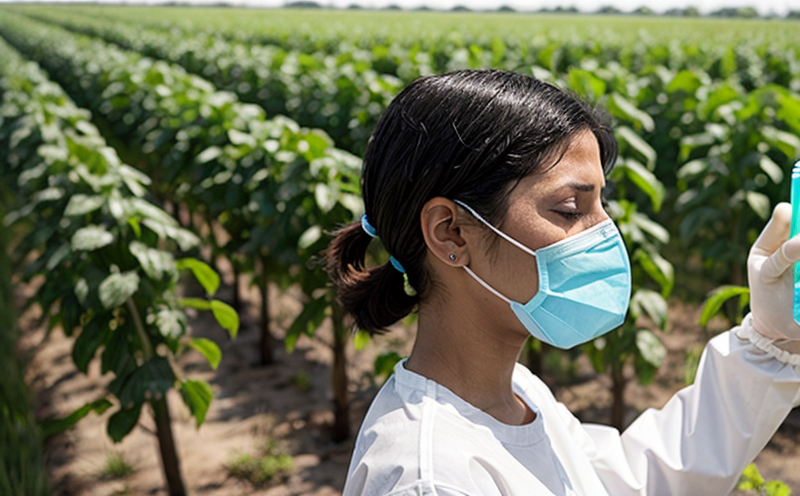ISO 22892 Pesticide Residues LC MS Test in Environment
The ISO 22892 standard outlines a comprehensive approach to quantifying pesticide residues in environmental samples. This method is particularly valuable for ensuring the safety and quality of agricultural products by identifying and measuring trace amounts of pesticides that may persist in soil, water, air, or foodstuffs.
The test involves several critical steps: sample collection, preparation, extraction, cleanup, and analysis using Liquid Chromatography (LC) coupled with Mass Spectrometry (MS). The LC-MS system allows for high sensitivity detection of even low concentrations of pesticides. This technique is essential in regulatory compliance, risk assessment, environmental monitoring, and R&D activities.
Our laboratory adheres strictly to ISO 22892 guidelines to ensure accurate results. We use state-of-the-art equipment such as the Thermo Fisher Scientific QQQ LC-MS/MS and Agilent 1260 Infinity LC coupled with an Agilent 7250A Mass Spectrometer, which provide precision and reliability in our measurements.
Sample preparation is crucial for achieving accurate results. We follow a multi-step protocol that includes:
- Sieving of soil samples
- Extraction using appropriate solvents
- Cleanup to remove interfering substances
- Dilution if necessary
The LC-MS/MS system then separates the components and identifies them based on their mass-to-charge ratios. This method ensures that even trace amounts of pesticides are detected, making it possible to determine compliance with regulatory limits.
Our service is ideal for quality managers, compliance officers, R&D engineers, and procurement teams who need reliable data on pesticide residues in the environment. By adhering strictly to ISO 22892 standards, we ensure that our clients receive accurate and consistent results every time.
The following table summarizes the applied standards:
| Standard | Description |
|---|---|
| ISO 22892:2013 | Pesticide Residues in Environmental Samples - Determination by Liquid Chromatography-Mass Spectrometry (LC-MS/MS) |
| ASTM D7546-13 | Standard Practice for Collection and Handling of Soil, Sediment, Sludge, and Other Waste Composites for Analysis |
Understanding the competitive advantage and market impact is essential to appreciate the significance of this service. Our commitment to ISO 22892 ensures that our clients are at the forefront of regulatory compliance, meeting stringent environmental standards.
Applied Standards
The primary standard used in performing ISO 22892 Pesticide Residues LC MS Test is ISO 22892:2013, which provides a robust framework for determining pesticide residues in environmental samples. This international standard ensures that the testing method is reliable, accurate, and consistent.
The second key applied standard is ASTM D7546-13, which outlines best practices for collecting soil, sediment, sludge, and other waste composites for analysis. Adherence to these standards guarantees that samples are collected in a manner that minimizes contamination and ensures accurate results.
The combination of these two standards allows us to offer a comprehensive service that meets the highest industry expectations. Our laboratory is equipped with advanced LC-MS/MS instrumentation, ensuring precise and reliable results for our clients.
Customer Impact and Satisfaction
The ISO 22892 Pesticide Residues LC MS Test is a cornerstone of environmental safety and regulatory compliance. Our customers benefit from:
- Accurate and reliable data on pesticide residues in the environment
- Compliance with international standards, ensuring legal and regulatory adherence
- Enhanced reputation through consistent quality assurance
- Improved decision-making capabilities for R&D activities and product development
- Risk assessment and mitigation strategies to protect public health and the environment
We strive to exceed customer expectations by delivering high-quality results in a timely manner. Our clients can trust that our laboratory adheres strictly to ISO 22892 standards, ensuring that their environmental samples are analyzed accurately and consistently.
Competitive Advantage and Market Impact
Our service provides a significant competitive advantage by:
- Offering rapid, accurate results that meet international standards
- Ensuring compliance with stringent environmental regulations
- Enabling clients to make informed decisions about product development and risk management
- Providing data that enhances the reputation of our clients' products and services
- Supporting sustainable practices in agriculture, food safety, and environmental protection
- Aiding in the identification and mitigation of potential risks associated with pesticide residues
By leveraging these advantages, we help our clients stay ahead of industry trends and regulatory changes. Our commitment to quality and accuracy ensures that our clients can trust us for their environmental testing needs.





